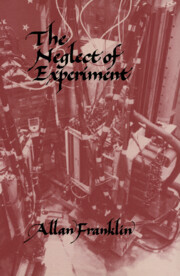Book contents
- Frontmatter
- Contents
- Acknowledgments
- List of abbreviations
- Introduction
- 1 The discovery of parity nonconservation
- 2 The nondiscovery of parity nonconservation
- 3 CP or not CP
- 4 The role of experiment
- 5 Do experiments tell us about the world?
- 6 The epistemology of experiment
- 7 The epistemology of experiment: case studies
- 8 Forging, cooking, trimming, and riding on the bandwagon: fraud in science
- Conclusion
- Notes
- Index
5 - Do experiments tell us about the world?
Published online by Cambridge University Press: 15 December 2009
- Frontmatter
- Contents
- Acknowledgments
- List of abbreviations
- Introduction
- 1 The discovery of parity nonconservation
- 2 The nondiscovery of parity nonconservation
- 3 CP or not CP
- 4 The role of experiment
- 5 Do experiments tell us about the world?
- 6 The epistemology of experiment
- 7 The epistemology of experiment: case studies
- 8 Forging, cooking, trimming, and riding on the bandwagon: fraud in science
- Conclusion
- Notes
- Index
Summary
If, as I have argued, experiment plays such an important role in physics, then we must have good reasons if we are to believe that experiments give us accurate and reliable information about the physical world. In the next four chapters we shall discuss several questions relating to this issue, including how we come to believe rationally in experimental results, and the question of fraud in science.
In this chapter I shall address a question raised by three historians of science, Peter Galison, Andrew Pickering, and Gerald Holton: the question whether or not the theoretical presuppositions of an experimenter influence the experimental results. There is at least an implicit suggestion that presuppositions may cause an experimenter to exclude data, to overlook unexpected results, and to either overlook or misestimate important sources of error. In Chapter 8 we shall examine the related issue of theoretical or experimental bandwagon effects: whether or not experimental results in disagreement with an accepted theory tend to be suppressed or excluded, and whether or not there is a tendency for experimental results to be in agreement with previous measurements.
In his study of gyromagnetic experiments in the early twentieth century, Peter Galison points out that theory often provides experimenters with quantitative predictions that enable them to find the effects sought or to separate an effect from background sources of error. Such a prediction may also influence the decision to stop looking for such sources of error, declare the experiment ended, and report the result, which may be that predicted by theory.
- Type
- Chapter
- Information
- The Neglect of Experiment , pp. 138 - 164Publisher: Cambridge University PressPrint publication year: 1986



